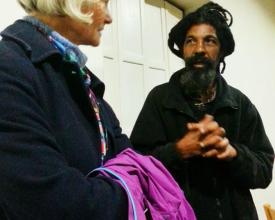Herbanisation
Herbanisation est un projet de jardin de rue médicinal en libre accès au Cap, en Afrique du Sud. Le projet vise à verdir les paysages de rue dans les zones économiquement marginalisées tout en contribuant aux moyens de subsistance des herboristes locaux Rasta/Khoi et en reconnectant les membres de la communauté avec les plantes médicinales. Les jardins d'herborisation comprennent actuellement 1 600 plantes à Seawinds, au Cap, et devraient atteindre 4 500 plantes d'ici à la mi-2015.
Contexte
Défis à relever
Emplacement
Traiter
Résumé du processus
Blocs de construction
Travailler avec des champions locaux
Facteurs favorables
Leçon apprise
Utiliser les jardins comme des véhicules
Facteurs favorables
Leçon apprise
Appliquer les principes du libre accès
Facteurs favorables
Leçon apprise
Impacts
1. L'herborisation a déjà donné lieu à un engagement novateur entre les herboristes rasta, les organismes de conservation et les organisations botaniques locales. En outre, le projet renforce les liens entre les activités du parc et les efforts de conservation urbaine, faisant de la nature locale un moteur essentiel des efforts de rénovation urbaine. 2. De nombreux habitants de Seawinds et des guérisseurs traditionnels locaux récoltent les produits des jardins de rue de l'Herbanisation pour se soigner et soigner leurs familles. Non seulement cela contribue à la santé et au bien-être de la communauté locale, mais cela permet également aux individus de prendre leur santé en main et de se sentir fiers de leur rôle en tant que détenteurs du savoir indigène. 3. Le site du jardin Seawinds abrite actuellement le caméléon nain du Cap (rare), le crapaud léopard occidental (en voie de disparition) et le conebush des plaines du Cap (en voie de disparition critique), ce qui démontre un impact positif évident sur la biodiversité locale. L'herborisation contribue également à la résilience bioculturelle locale.
